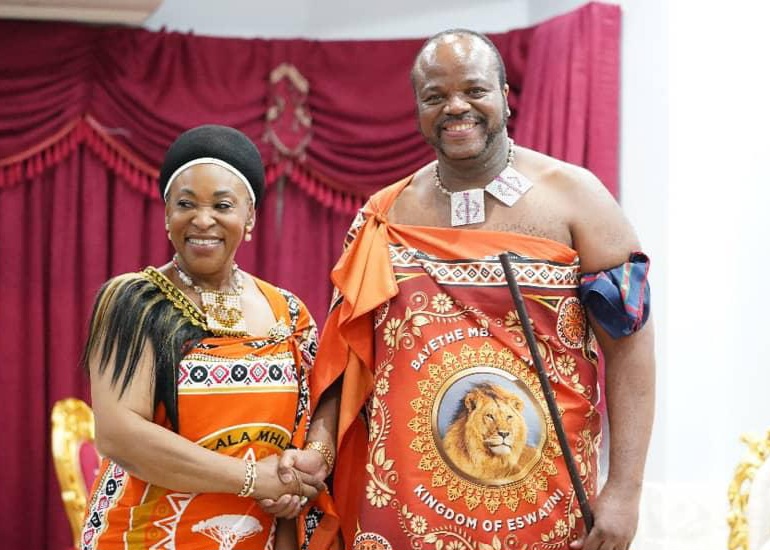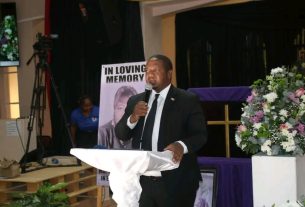BY KING’S OFFICE CORRESPONDENTS
APIA, SAMOA: As new Secretary General Shirley Ayorkor Botchwey assumes office at the Commonwealth, Eswatini anticipates she will take forward her predecessor’s pledge to the country.
When outgoing Secretary Patricia Scotland last visited the country, she pledged a master plan to address Eswatini’s priority areas and emphasised the Commonwealth Secretariat’s commitment to being a development partner with Eswatini.
She also highlighted the availability of Commonwealth toolkits for various technical assistance programs, which will be useful when the government implements the proposed reforms.
Scotland met with His Majesty, government officials and civil society representatives.
Her pledge is one of several areas of support extended by the Commonwealth to the country.
The Commonwealth supports and guides governments in terms of democracy, governance and the rule of law.
The Commonwealth Human Rights Unit periodically provides technical assistance for human rights and public administration.
This becomes beneficial when the United Nations, through the Universal Periodic Review (UPR), assesses the human rights records of all UN Member States. The UPR, under the Human Rights Council, regularly affords Eswatini the opportunity to declare its efforts to improve human rights in the country and to fulfil its human rights obligations.
The Commonwealth Secretariat provides substantial support in implementing this process.
The Commonwealth’s support has been evident in handling cases that have scrutinized both the 2005 constitution and the Tinkhundla system. Eswatini has frequently consulted the Commonwealth and the UN Human Rights Council for technical support and review to address and rectify areas of concern.
The government commits funds through voluntary/pledged and assessed contributions to the three Commonwealth intergovernmental organs, benefiting both government and civil society—including all citizens—in matters such as these.
Since joining in 1968, Eswatini has subscribed to the Commonwealth Charter and actively participated in formulating and endorsing Commonwealth Outcome Statements and Declarations.
The Commonwealth encourages governments to uphold democracy, peace, and the other values expressed in the Commonwealth Charter.
The Commonwealth is currently involved in valuable proposed and ongoing projects, focusing on the following areas:
• Protecting the environment and encouraging sustainable use of natural resources on land and sea
• Boosting trade and the economy
• Supporting democracy, governance, and the rule of law
• Developing society and young people by promoting gender equality, education, health, and sports
• Supporting small states, helping them address the particular challenges they face
The Commonwealth Secretariat provides technical assistance to all member countries in these areas.
Two other intergovernmental organisations within the Commonwealth family—namely, the Commonwealth Foundation and the Commonwealth of Learning—also contribute significantly to Eswatini’s development. The Commonwealth Foundation encourages public participation in democracy and development, while the Commonwealth of Learning promotes open learning and distance education across the Commonwealth.
If membership is in jeopardy, the private sector and civil organisations could lose their benefits.
As Commonwealth citizens, EmaSwati enjoy various benefits, including opportunities in education, careers, travel, and business across the 56 Commonwealth member states. Both the Eswatini government and civil society view membership in the Commonwealth as advantageous.
GHANA’S FOREIGN AFFAIRS MINISTER NEW COMMONWEALTH SECRETARY GENERAL
APIA, SAMOA: Ghana’s Foreign Affairs and Regional Integration Minister, Shirley Ayorkor Botchwey, is the new Secretary General of the Commonwealth.
She takes over from Patricia Scotland, who has held the position for the past two four-year terms.
This was announced during the ongoing 27th Commonwealth Heads of Government (CHOGM) meeting yesterday.
Botchwey has travelled to many countries of the Commonwealth during her campaign for the position. This includes Eswatini, which she visited during the Hlane Buganu ceremony and met His Majesty the King.
She assumes the office of the Commonwealth Secretariat, which supports member countries to build democratic and inclusive institutions, strengthen governance and promote justice and human rights. It also helps to grow economies and boost trade, deliver national resilience, empower young people, and address threats such as climate change, debt and inequality.
Leading up to her announcement, Botchwey had promised to reposition the organisation for all members, especially developing countries. She said she believes that together, member countries can achieve climate resilience, promote economic transformation through increased trade and investment, and leverage technology to create opportunities for the youth.
“We can also promote good governance to build resilient and thriving societies and resource our organisation better. As your Secretary-General, I will use my well-known passion for accountable governance and my extensive experience working with global leaders on interventions involving diplomacy, trade, youth, gender and democracy to reposition the Commonwealth, fulfil our aspirations, and improve the lives of our people,” she promised.
ABOUT BOTCHWEY
Shirley Ayorkor Botchwey is a lawyer and politician who has served as Ghana’s Minister for Foreign Affairs and Regional Integration since 2017.
Botchwey is a Barrister and Solicitor of the Supreme Court of Ghana. She holds a law degree from the Ghana School of Law as well as a Bachelor of Laws (LLB) from the University of London.
She also holds an Executive MBA from the University of Ghana Business School, Legon, and an MA in Public Communications & Public Relations from the University of Westminster, London.
She is a member of the Ghana National Association of Alternative Dispute (ADR) Practitioners, a Fellow of Africa Leadership Initiative (West Africa), and the Aspen Institute Global Leadership Network. She is a mother of two.
According to her profile, she has a wealth of experience in diplomacy that goes back almost two decades, to 2005. During President John Kufuor’s administration, she served as Deputy Minister for Foreign Affairs for four years. Before that, she held the positions of Deputy Minister for Information and Deputy Minister for Trade and Industry.







